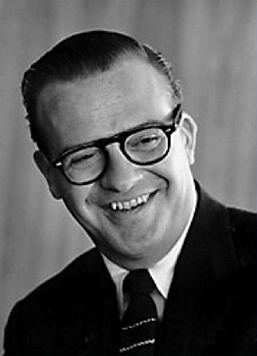
A memorable personality in pharmaceutical advertising achieves renown by leaving his mark on the industry in countless ways. With Dean Burdick, beyond his record of accomplishment as an agency leader, we can identify three prominent qualities which lead to his election to the Medical Advertising Hall of Fame.
The first was his dramatic, entrepreneurial departure in 1957 from William Douglas McAdams, where he had been a key executive, to form with Robert Becker and Don Fitzsimmons a new agency, Burdick Becker & Fitzsimmons. Up until he left McAdams, there had been no major defections from the four major agencies which had come to dominate pharmaceutical advertising after WWII-McAdams, Frohlich, Klemtner, and Sudler & Hennessey. Burdick and his partners showed that the booming market for Rx advertising and promotion could not be fully serviced by the existing agencies, that there was room for new agencies, and that clients would be receptive to those who had served their apprenticeships at the older agencies and were now willing to compete with their former employers. Burdick was a “name” at McAdams and by leaving, he set an example which others followed, “going out on their own” to found new agencies.
His second contribution was as a creator. He was a writer famous for his campaign concepts and headlines that expressed the central idea of the program. “The Boy with Green Hair” for Ayerst’s Grisactin dramatized the product by focusing on a diagnostic test that employed ultraviolet light to identify fungal infections of the scalp. “Blood, Milk, and Maalox” headlined an ad that summed up the basic therapy for ulcers before the discovery of H2 products. “Wanted: Dead Not Alive” were the attention-getting words for Ayerst ampicillin. Burdick brought this ability to the introduction of landmark drugs—Inderal, Aristocort, and Symmetrel, for example. At a time when avant-garde graphics were the hallmark of Rx advertising, Burdick matched their excellence with equally contemporary and imaginative writing.
His third contribution was as the nurturer of account service talent. Burdick, described as a shy man, chose not to personally represent the work of his agency, Dean L. Burdick Associates. He socialized with company executives, particularly on the golf course, but he usually avoided the presentation of his ads, leaving that to his account executives. Moreover, because he concentrated on writing, he also delegated to his account personnel the management of the financial, media, and production aspects of the business. As a result, to be an account person at his agency was to experience a crash course in all phases of agency operations.
One of the Burdick “alumni” who went on to become a leader in the field describes his experience at the agency: “It was a great thing for young people…you had to do everything…get the bills out…do the media schedules…write your own programs…sometimes write copy. When I made my first move [to another agency] I was amazed that there were people there to do copy, send out bills, proofreading, and media because I was used to doing most of that myself…it was a great place to learn.”
Burdick took company sales representatives directly from the field and made them account executives with the responsibility to represent the agency and to sell the advertising he had created. Recruitment from Rx sales forces is not unusual, but what was notable at Burdick’s agency was the absence of supervision. His system worked because he was a remarkable judge of talent and character and because he inspired intense loyalty from his staff. The young men he brought in from the field and to whom he had given so much opportunity responded with dedication to their work and to Dean. As one recalls, “He had a charisma that got people to want to help him.”
Burdick was equally loyal to his staff and as time went by, he and a core of long-time employees found it increasingly difficult to make the organizational and staff changes a more competitive agency demanded. The agency eventually had to be closed and Burdick became a creative consultant on a number of industry projects.
Dean died in 1984. As an important participant in the industry’s boom in the ’50s, his memorable advertising for pharmaceuticals advanced the level of healthcare advertising. Additionally, his agency provided a training ground for a group of Rx marketing executives who went on to successful careers in the industry. It is because of these reasons that he is remembered with such respect and affection.